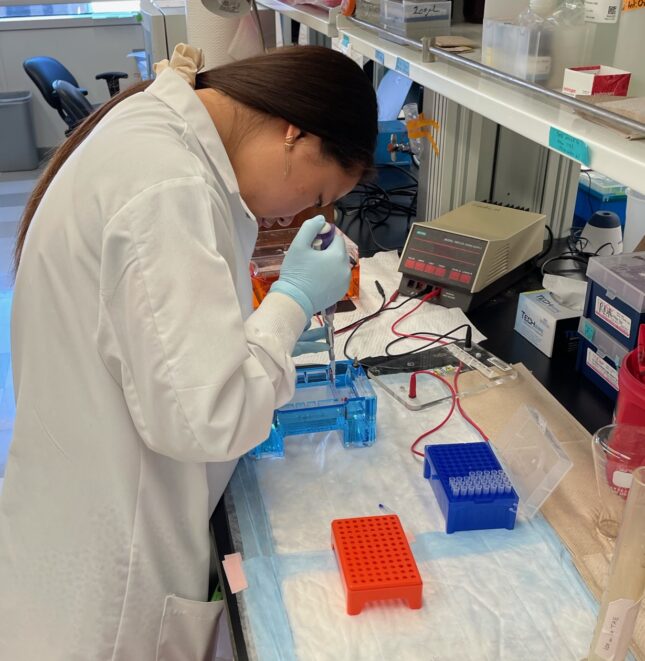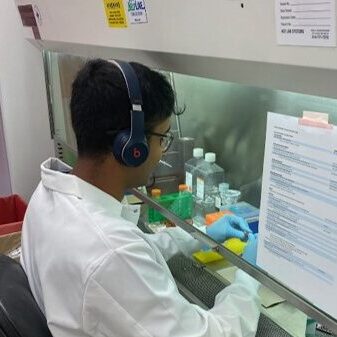Mechanisms in the Pathogenesis of Congenital Heart Disease
Under the guidance and supervision of Dr. Eghtesady and Dr. Garand, our laboratory conducts basic and clinical research to explore the causes of congenital heart diseases. We test hypotheses both by analysis of specimens from woman with pregnancies affected by CHD, pediatric patient samples, as well as by studying offspring in animal models exposed to infections in early gestation. To drive discoveries, we used advanced experimental and analytical tools such as phage immunoprecipitation coupled with next generation sequencing technology.
Our ongoing research to understand the causes of Congenital Heart Disease (CHD) includes:

Prevalence of human Pegivirus in subjects with SARS-CoV-2 infection
Ching Ching Zhang
Our lab is interested in Pegivirus, a Flavivirus family member that is thought to be benign with very little known about it. However, research has shown that coinfection of Pegivirus and HIV results in the possibility of a protective effect that reduces the chances of reactivation of latent HIV. We have queried plasma samples from patients with SARS-CoV-2 infection to look for presence of co-infection and impact on the COVID-19 clinical manifestations, if any. Viral nucleic acid is extracted from plasma samples while detection of Pegivirus will be done with an established quantitative RT-PCR assays with a standard curve.
On the dry lab side, Ching Ching is working on a mini review of Pegivirus coinfection with various sorts of viruses such as HIV, HBV, HCV, Ebola, Malaria, etc. While there have been well over 300 studies done regarding Pegivirus coinfection, the varying geographic distribution, large range of results, and contradicting studies has made it extremely difficult to arrive at a consensus of the frequency of Pegivirus’ beneficial impacts.

Investigating Enterovirus and the stool microbiome in pregnant women with and without diabetes
Pranav Kirti
Enterovirus has been a major interest of the lab due to its significance in congenital heart disease (CHD). Diabetes and pregnancy are common major factors that affect the microbiome, especially considering that Type I and II diabetes are known to increase the severity of infections. In order to deeply understand the interplay between Enterovirus and the microbiome, we must understand how common factors effect its presence and role in the microbiome.
Pranav’s dry-lab work for this project initially involved searching for public data repositories and exploring cloud computing for analysis. Now, he is using R and Python to write a bioinformatics pipeline for analysis of microarray data. On the wet-lab side, he performs extraction, purification, and quantification with bio specimens such as human whole blood, plasma, white blood cells, stool, and nucleic acid. He also uses RT-qPCR, gel electrophoresis, viral culture, and more for his project.
Perinatal viral infection on development of heart defects in animal models
Our long-term goal is to understand the burden and mechanism(s) of virally-induced CHD. We and others have data to support a role of “cardiotropic” viruses (i.e., viruses that have specific receptors in the fetal heart) in causing heart defects, by interfering with normal development during the critical window of first trimester. These studies have shown infection with type B coxsackievirus (CVB) in early gestation induces heart defects in mice (https://pubmed.ncbi.nlm.nih.gov/33440998/). To determine mechanisms in mediation of heart defects by CVB our studies include examination of the proliferation of CVB and signal transduction pathways.
The coxsackievirus-adenovirus (CAR) receptor plays a critical role in embryonic heart development, supporting our hypothesis that viral infections can be detrimental to normal cardiac formation (https://pubmed.ncbi.nlm.nih.gov/33369284/). Using Cre-lox technology to achieve tissue-specific deletion of the CAR gene we are examining heart development in mice.
